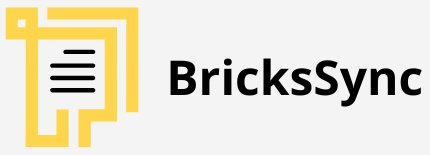Description
BricksSync is a powerful tool for synchronizing and migrating Bricks Builder global settings and templates between different WordPress installations. It uses Git-friendly JSON files, making it ideal for team development, staging/production workflows, and robust backup strategies. BricksSync supports both manual and automated sync via WP Cron, and integrates with WP-CLI for advanced or scripted workflows.
Features
- Export Bricks Builder global settings to a JSON file for backup or migration.
- Import Bricks Builder global settings from a JSON file.
- Export Bricks Builder templates to JSON files.
- Import Bricks Builder templates from JSON files.
- Export Bricks Builder components to JSON files.
- Import Bricks Builder components from JSON files.
- Choose where JSON files are stored: Child Theme, Uploads Folder, or a custom path.
- Multiple sync modes:
- Manual Only: No automatic import/export.
- Automatic Import Only: Automatically imports if files change.
- Automatic Export Only: Automatically exports when changes occur.
- Full Automatic Sync: Imports then exports (use with caution).
- Direct transfer mode, for transferring templates, components and settings directly between sites.
- Granular configuration for file naming, subdirectories, and exclusion options.
- WP-CLI integration for automated, repeatable, or advanced workflows.
- Debug tab with real-time log viewer, log clearing, and logging toggle.
- Option to disable licensing checks via constant (for development or testing).
- Cron support for scheduled sync and automation.
- Automatic creation of .htaccess to block direct JSON access (for Apache).
- Security recommendations for Nginx and lighttpd.
- Troubleshooting and detailed logging for all major operations.
Requirements
- WordPress (latest version recommended)
- Bricks Builder Theme (latest version recommended)
- PHP 8.0 or higher
Recommended
- Use a Child Theme for best results and Git-based workflows.
Installation
- Download the BricksSync plugin .zip file from BricksSync.com.
- Log in to your WordPress admin area.
- Go to Plugins > Add New.
- Click “Upload Plugin” and select the brickssync.zip file.
- Click “Install Now” and then “Activate Plugin”.
Configuration
After activation, go to “Bricks > BricksSync” in your WordPress admin menu.
Templates Tab
- Export Templates: Export all or selected templates to JSON files.
- Import Templates: Import all or selected templates from JSON files (may update existing templates; always backup first!).
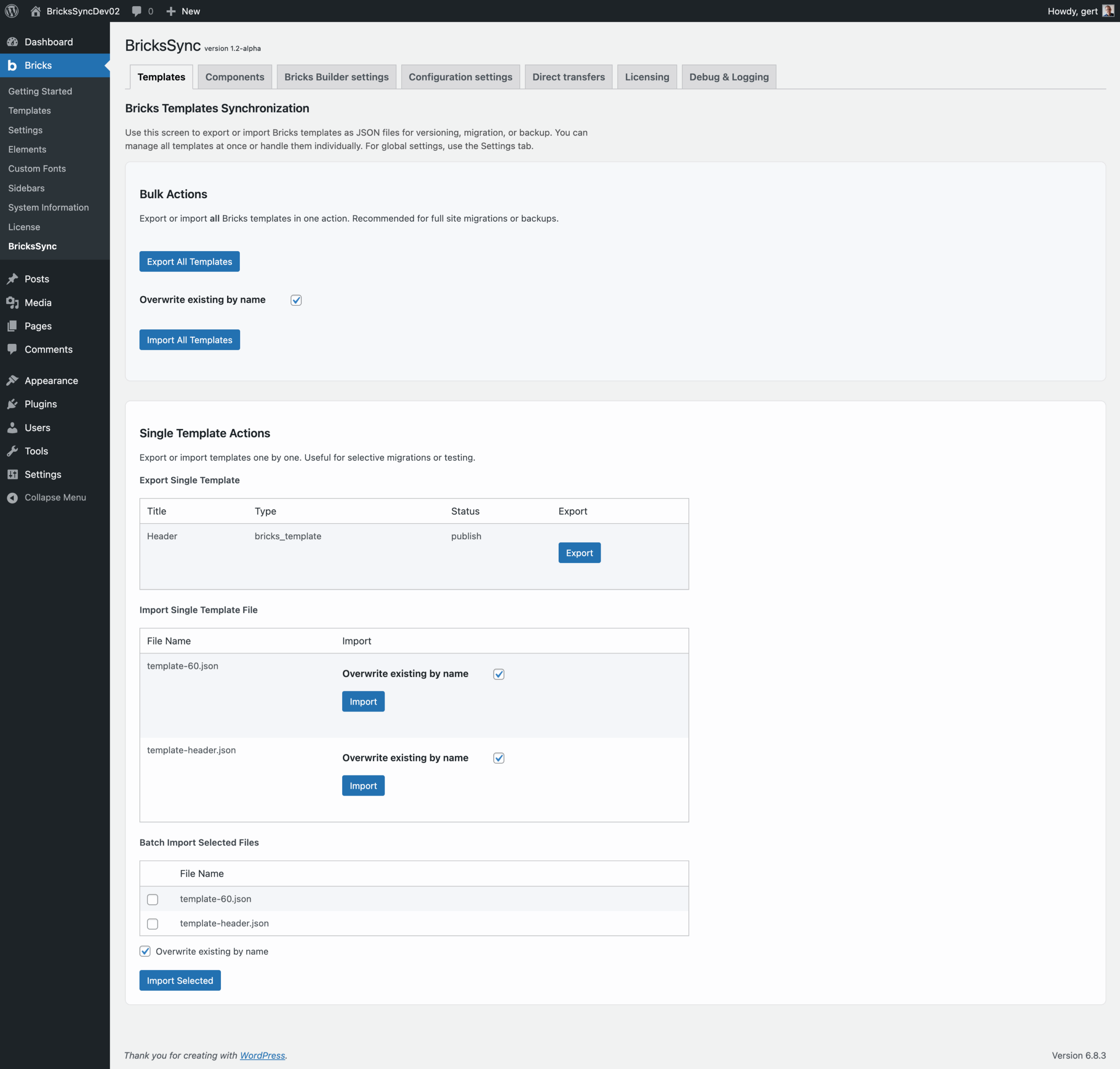
Components Tab
- Export Components: Export all or selected components to JSON files.
- Import Components: Import all or selected components from JSON files (may update existing components; always backup first!).
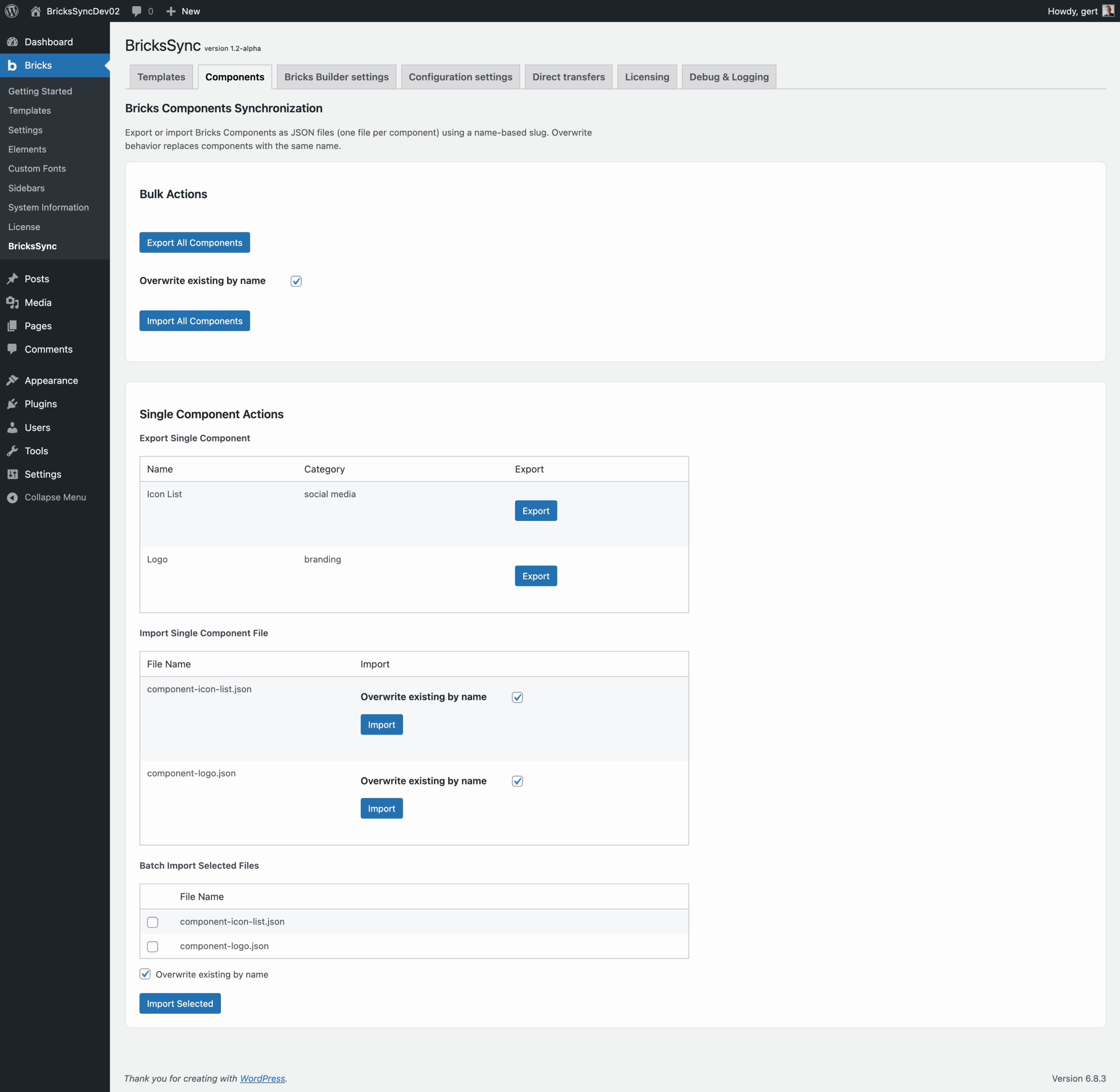
Bricks builder settings Tab
- Export Settings: Save current global settings to JSON.
- Import Settings: Load global settings from JSON (overwrites current settings; always backup first!).
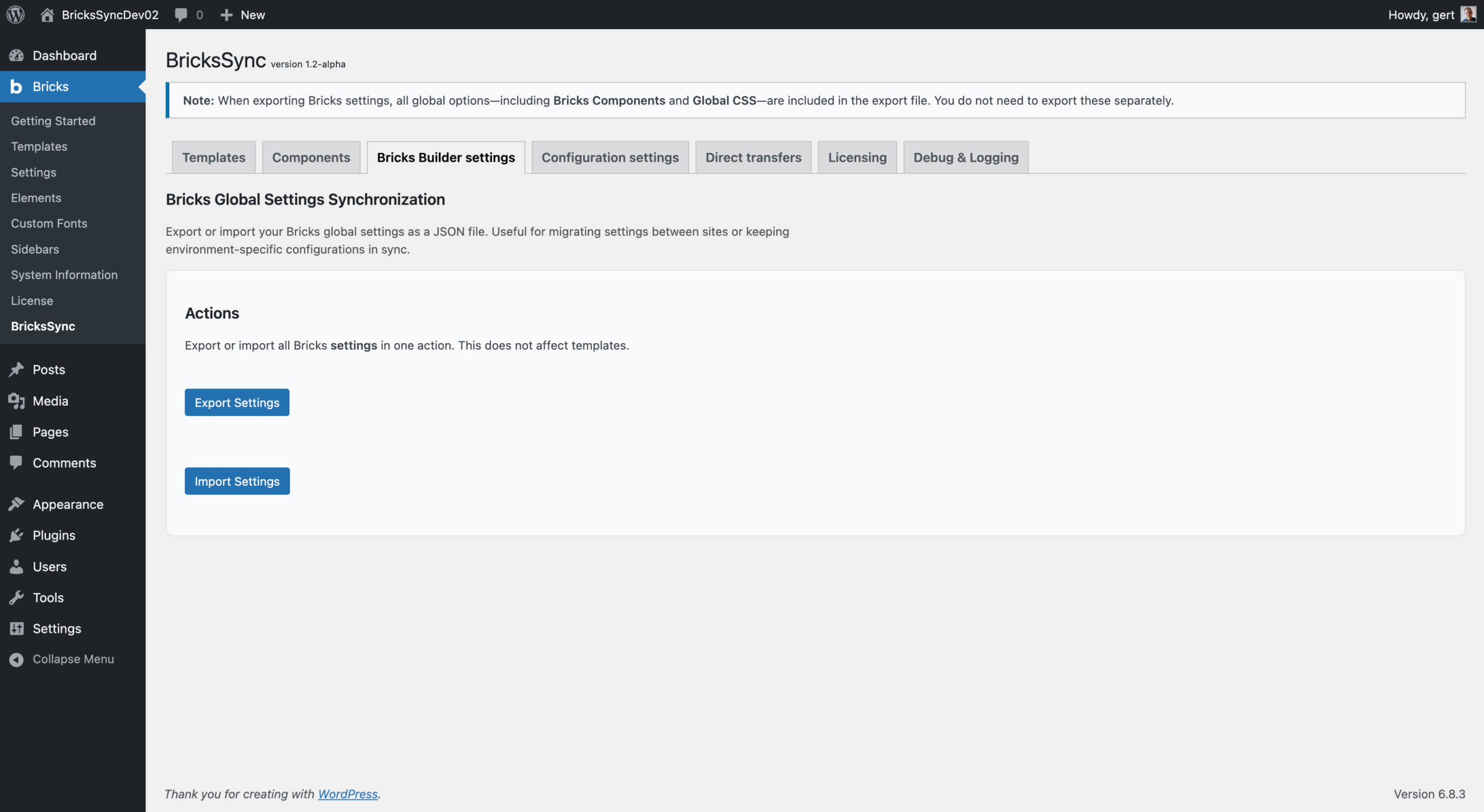
Configuration Tab
- Choose JSON storage location: Child Theme, Uploads Folder, or Custom Path.
- Set file naming options for settings and templates.
- Define JSON subdirectory name.
- Exclude specific options from export (e.g., bricks_license_key).
- Select sync mode:
- Manual Only: No auto actions (default).
- Automatic Import Only: Imports from storage path if files change.
- Automatic Export Only: Exports current data to storage path.
- Full Automatic Sync: Imports THEN Exports.
- Enable or disable settings sync automation (useful if you want to automate template sync but manage settings manually).
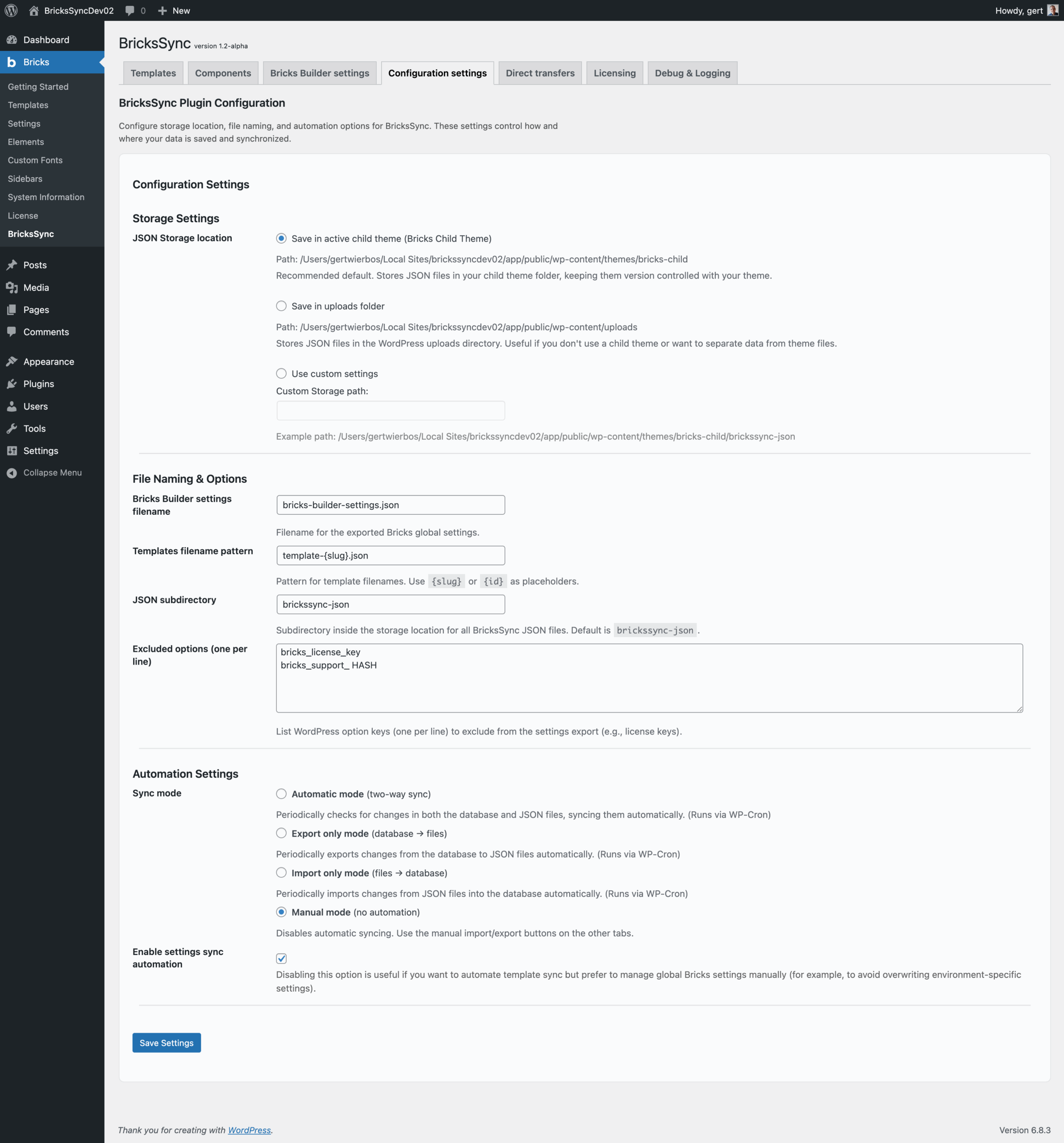
Direct Transfer Tab
- Parent mode: Makes all templates, components and settings available when Child site is connected
- Child mode: Connect to parent and pull in templates, components and settings manually, by cron, or by running a wp cli command.
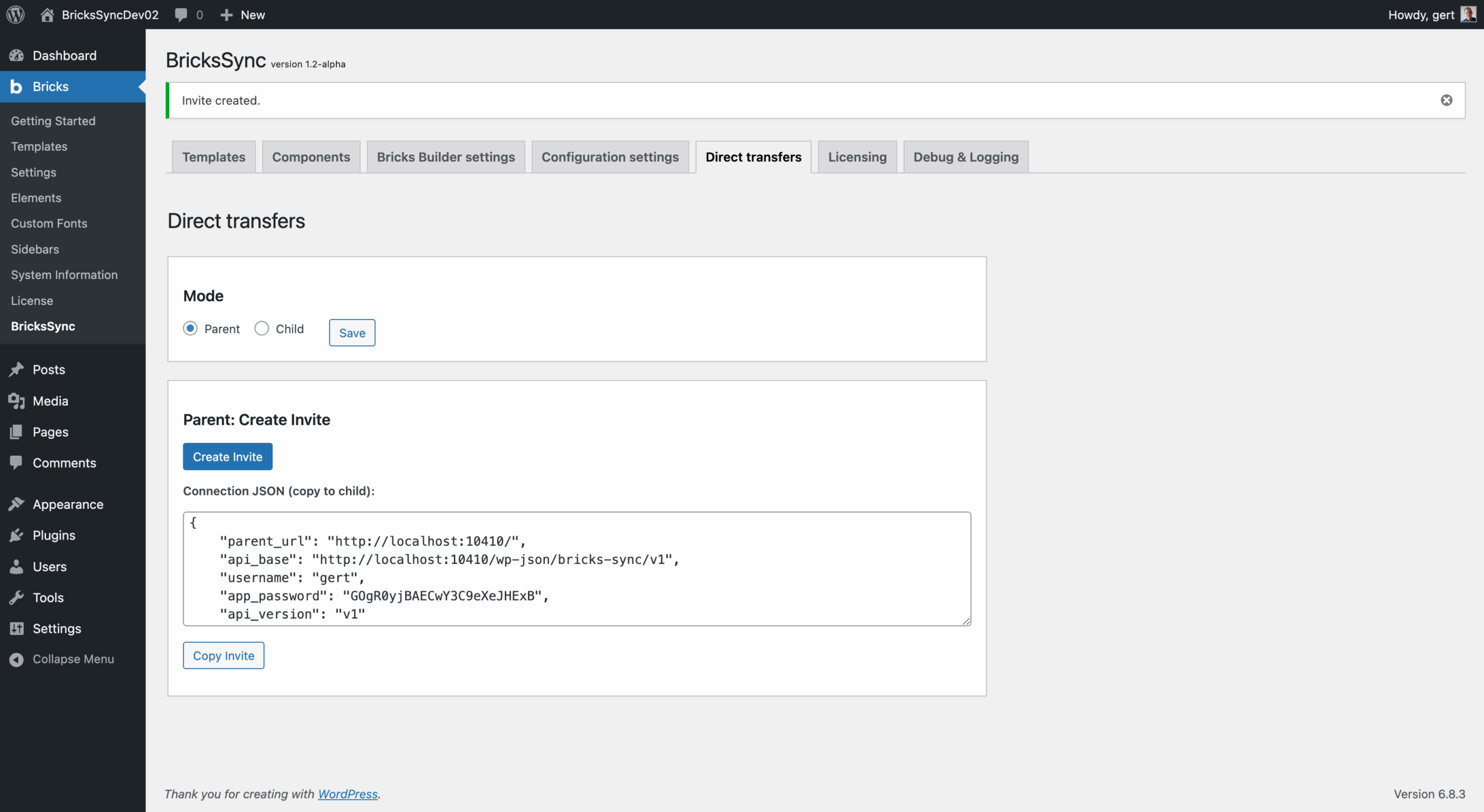
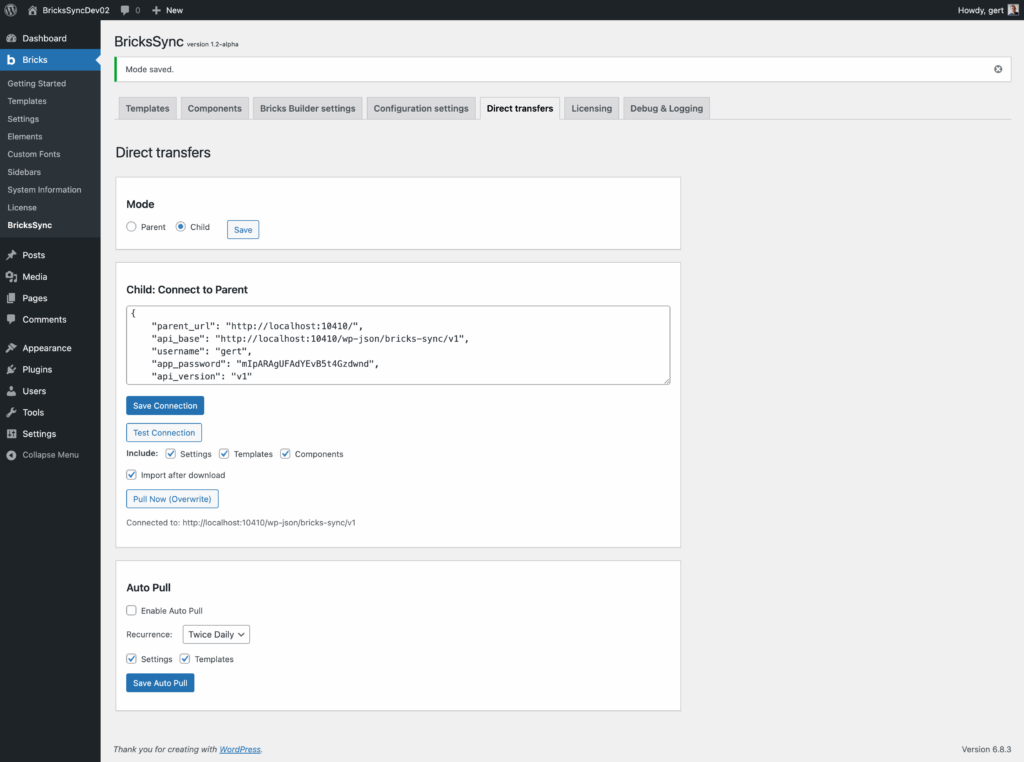
Licensing Tab
- Enter your license key and click “Activate License”.
- View masked license details and activation status.
- Deactivate license if needed.
- If you want to disable licensing checks (for local development or secure environments), define the constant
BRICKSSYNC_DISABLE_LICENSINGin your wp-config.php.
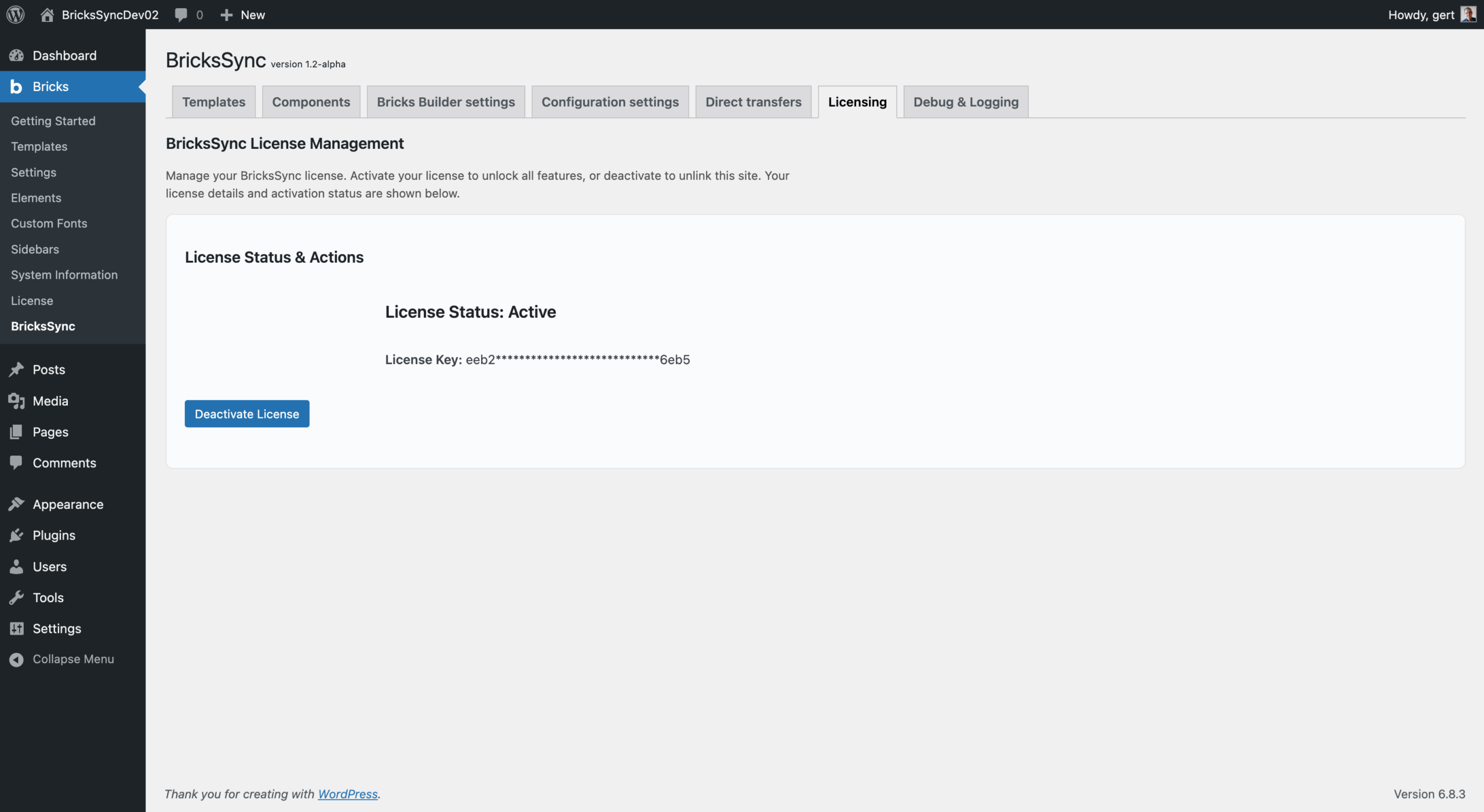
Debug Tab
- View the debug log in real-time.
- Clear the debug log.
- Toggle logging on or off for troubleshooting.
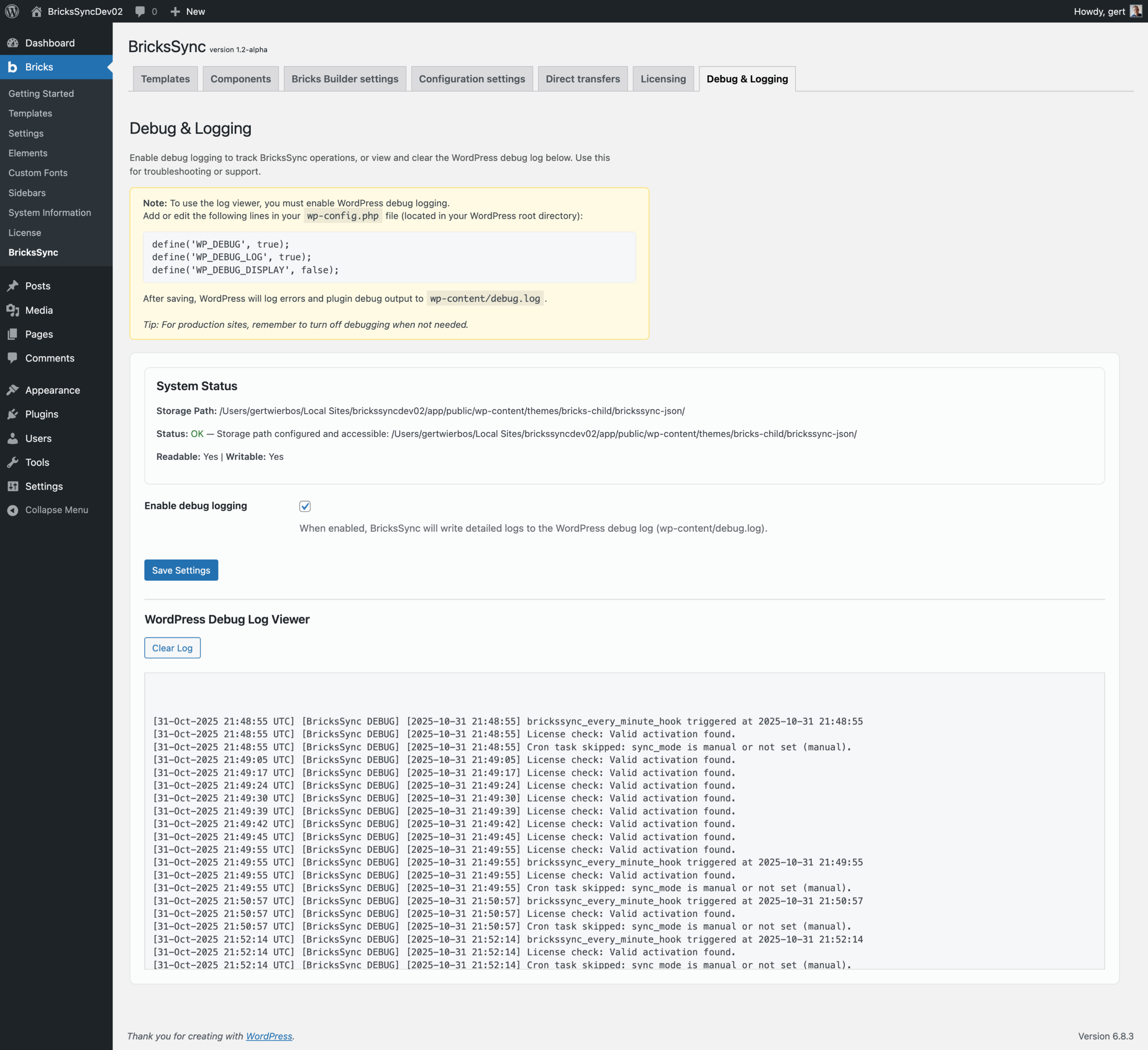
WP-CLI Integration
BricksSync provides a set of WP-CLI commands for managing Bricks Builder settings and templates from the command line.
Overview
- Export/Import Bricks Builder settings
- Export/Import Bricks templates
- Configuration management
- Status checking
Requirements
- WP-CLI must be installed and available
- Active BricksSync license for most operations
- Appropriate file permissions for import/export
Available Commands
Settings Management
Export Settings
wp brickssync settings export [--output-file=<path>]Exports all Bricks Builder settings to a JSON file. The file can be saved to a custom location or use the configured path.
--output-file: Path to export the JSON file. If not provided, uses the configured path and filename.
Examples:
wp brickssync settings export
wp brickssync settings export --output-file=/path/to/my-settings.jsonImport Settings
wp brickssync settings import [--file=<path>]Imports Bricks Builder settings from a JSON file. The file can be read from a custom location or the configured path.
--file: Path to the JSON file to import. If not provided, uses the configured path and filename.
Examples:
wp brickssync settings import
wp brickssync settings import --file=/path/to/import-settings.jsonTemplate Management
List Templates
wp brickssync templates list [--format=<format>]Displays a list of all Bricks templates with their details.
--format: Output format (table,json,csv,yaml,count). Default:table.
Examples:
wp brickssync templates list
wp brickssync templates list --format=csvExport Templates
wp brickssync templates export [--output-dir=<path>] [--templates=<ids>]Exports selected or all Bricks templates to JSON files.
--output-dir: Directory to export templates to. If not provided, uses the configured path.--templates: Comma-separated list of template IDs to export. If not provided, exports all templates.
Examples:
wp brickssync templates export
wp brickssync templates export --output-dir=/path/to/templates
wp brickssync templates export --templates=123,456Import Templates
wp brickssync templates import [--input-dir=<path>]Imports Bricks templates from JSON files in a directory.
--input-dir: Directory containing template JSON files. If not provided, uses the configured path.
Examples:
wp brickssync templates import
wp brickssync templates import --input-dir=/path/to/templatesConfiguration
Show Configuration
wp brickssync config show [--format=<format>]Displays the current BricksSync configuration settings.
--format: Output format (table,json,yaml). Default:table.
Examples:
wp brickssync config show
wp brickssync config show --format=jsonStatus
Check Status
wp brickssync status [--format=<format>]Displays the current status of BricksSync, including license status, storage path validation, and sync status.
--format: Output format (table,json,yaml). Default:table.
Examples:
wp brickssync status
wp brickssync status --format=jsonFeatures
- Multiple output formats (table, JSON, CSV, YAML)
- Custom file path support for imports/exports
- License validation integration
- Detailed status reporting
- Error handling and logging
- Automatic directory creation
- Permission validation
- Progress reporting
Error Handling
All commands include error handling and will display appropriate error messages if:
- The license is inactive
- File permissions are insufficient
- Required files or directories are missing
- Invalid parameters are provided
Notes
- Most commands require an active BricksSync license
- File paths should be absolute
- The plugin must be properly configured before using these commands
- Debug logging can be enabled for troubleshooting
Usage Scenarios
Manual Development GIT Workflow (Local → Staging → Production):
- Use Child Theme storage.
- Use Manual Only mode.
- Export locally.
- Commit generated JSON files to Git.
- Pull on Staging/Production.
- Import on Staging/Production and test.
Partially Automated GIT Workflow:
- Use Child Theme storage.
- Use Export Only on Local, Import Only on Staging/Production.
- Exports on template saving.
- Commit JSON files to Git.
- Pull and import automatically on Staging/Production when you are ready
Simple Backup:
- Use Uploads Folder storage.
- Use Manual or Auto Export mode.
- Export settings/templates to uploads folder.
Direct Transfer:
- Set up Parent/Master on export mode and add connection by clicking “Create invite”
- Set up one or multiple Children/Slaves on import mode and copy connection info from parent.
- You can now manually or automatically transfer Templates/Components/Settings directly!
Security
- For Apache: .htaccess is created automatically to block direct access to JSON files.
- For Nginx/lighttpd: Follow provided recommendations to secure JSON directories (see documentation).
- For maximum security, consider storing JSON files outside the web root.
- Never commit sensitive data (like license keys) to your repository.
Plugin Updates
- BricksSync supports updates via the standard WordPress plugin updater when a valid license is active.
- Always backup your settings and templates before updating.
Troubleshooting
- Use the Debug tab to view and clear logs.
- Ensure correct permissions for storage directories.
- If licensing fails, check your key and internet connection.
- If sync is not working, check the selected storage location and file permissions.
Changelog
Please check the Roadmap for the latest changes!
